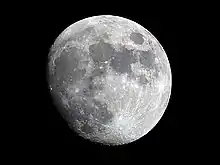lúa
See also: Appendix:Variations of "lua"
Galician

Lúa
Etymology
14th century. From Old Portuguese *lũa, from Latin lūna.
Pronunciation
- IPA(key): /ˈluɐ/
Noun
lúa f (plural lúas)
- a moon or natural satellite of any planet
- moonlight
- Synonym: luar
- a lunar month
- Synonym: lunación
Related terms
See also
References
- “lua” in Dicionario de Dicionarios do galego medieval, SLI - ILGA 2006-2012.
- “lua” in Xavier Varela Barreiro & Xavier Gómez Guinovart: Corpus Xelmírez - Corpus lingüístico da Galicia medieval. SLI / Grupo TALG / ILG, 2006-2016.
- “lua” in Dicionario de Dicionarios da lingua galega, SLI - ILGA 2006-2013.
Icelandic
Vietnamese
Etymology
From Proto-Vietic *ʔa-lɔːʔ (“paddy rice”). Compare Nghệ An/Hà Tĩnh dialects ló; cognate with Arem /alɑːˀ/.
According to Ferlus, it is a loanword from Old Chinese 稻 (OC *l'uːʔ) (SV: đạo), in turn related to Proto-Mon-Khmer *sruʔ (“paddy rice”) and Proto-Mon-Khmer *t₂rawʔ ~ *t₂raaw() (“taro”). Ferlus reasons that the two different plants share the same ecological farming niche, thus facilitating semantic shift from "taro" to "rice".[1] Shorto notes a dubious connection between Proto-Vietic *ʔa-lɔːʔ and Proto-Mon-Khmer *s-ruʔ (“paddy”).[2]
Pronunciation
- (Hà Nội) IPA(key): [luə˧˦]
- (Huế) IPA(key): [luə˨˩˦]
- (Hồ Chí Minh City) IPA(key): [luə˦˥]
Noun
(classifier cây) lúa
- rice (with seed still in stalk)
- (Central Vietnam, Southern Vietnam) paddy; unhusked rice
- Synonym: thóc
Derived terms
Derived terms
References
- Ferlus, Michel. “The Austroasiatic Vocabulary for Rice: its Origin and Expansion.” Journal of the Southeast Asian Linguistics Society 3.2 (2010), 61-76.
- Shorto, H. A Mon-Khmer Comparative Dictionary, Ed. Paul Sidwell, 2006. Entry 187. p. 111
This article is issued from Wiktionary. The text is licensed under Creative Commons - Attribution - Sharealike. Additional terms may apply for the media files.